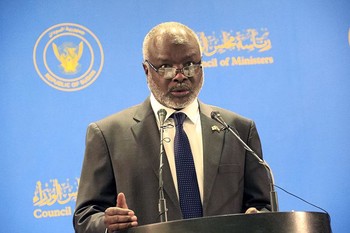Sudan economist calls Finance Minister’s speech ‘political’

Sudan’s Minister of Finance and head of the Justice and Equality Movement, Jibril Ibrahim (File photo: Sudan govt)
According to economist Awadallah Mousa the statements of the Minister of Finance about the Sudanese economy on Saturday “are nothing more than a public political speech”.
Mousa considers the statements of Finance Minister Jibril Ibrahim on the Sudanese economy during his address to a crowd in Hasaheisa in El Gezira on Saturday, as an attempt “to raise the morale, but they are imperceptible”.
In his speech, the Minister acknowledged the suffering of the Sudanese caused by repeated increases in the prices of consumer goods, though the government succeeded in stabilising the exchange rate of the Sudanese Pound and in reducing inflation rates.
He further explained that the funds gained by lifting subsidies on consumer goods have been used to increase the budgets for health, social development, education, and the provision of drinking water. The 2023 budget contains increased budgets for education and drinking water.
“The government is in the process of constructing huge projects, including the construction of a $6 billion port [in Red Sea state] and the construction of a railway that will connect Port Sudan with all the landlocked neighbouring countries – which will accommodate tens of thousands of workers,” he added, and pointed out that “we have been able to persuade the Arab and African world to invest in food and support agriculture in Sudan”.
The Finance Minister and leader of the Justice and Equality Movement that supported the October 2021 coup d’état, further called on the farmers of El Gezira “not to believe rumours about the expropriation of their lands. The ministry is seeking partnerships with advanced parties to increase production.”
Stagflation
Economist Awadallah Mousa however contradicted Ibrahim’s optimism in an interview with Radio Dabanga on Sunday.
Regarding the stability of the exchange rate of the Sudanese Pound, Mousa said that the reason “probably lies in the economic negatives related to the recession and the imbalance in demand and supply”. The rate of development is almost zero.
As for the inflation in the country, the economist said that it “has increased significantly, in particular the prices of fuel and electricity, have witnessed unprecedented increases, to the extent that the workers’ monthly salaries have become too low to even cover their transportation costs”.
Mousa further pointed out that the payment of salaries is not an achievement, but the duty of the state.
In December, economist Kamal Karrar questioned reports of the Sudanese Central Bureau for Statistics regarding the decrease in inflation in November to 88.83 per cent. “Contrary to what the Central Bureau for Statistics reported, the prices of consumer goods and various services are still rising. Any Sudanese can tell you that,” he said.
“Semi-independent reports on the inflation in Sudan this year until now say that the price increases exceed 1,000 per cent,” he explained. “It is likely that the purpose of these reports is to deliver a message to the Sudanese and foreign public opinion, showing that the economic policy based on the specifications of the International Monetary Fund and the World Bank has positive results, as evidenced by the drop in inflation.”
Professor Esam Abdelwahab Bob does not believe the inflation figures, because they “aren’t grounded in authentic statistical surveys and given the stormy political climate they may not be true”. He explained to Sudan Tribune in October that inflation was traditionally known to be the diminishing ability of a unit of currency to buy goods and services, but that it it may occur while the economy is still growing. However, these days and globally there is increasing talk of stagflation, which is inflation coupled with low growth rates, high unemployment, depressed wages, and a growing deficit in the balance of payments.











 and then
and then